Stephanie Ogden
Stephanie Ogden is the International Trachoma Initiative’s coordinator for Water, Sanitation, and Hygiene (WASH). She also works with the Children Without Worms program at the Task Force for Global Health, and the Emory University Center for Global Safe Water.
Mariya Pak

Area of water-related interest/research: International water management, water sharing, international water agreements.
Select some excerpts from your internship journal that will explain what you did for your internship and where you worked:
I am working for the International Water Management Institute (IWMI) and developing a database on international water related agreements. I am writing short legal history profiles for small transboundary tributaries (33 small tributaries) in the Fergana Valley, Central Asia.
The photo: The photo shows me presenting at an International workshop titled Capacity Building in Sustainable Water Resources Management in Central Asia organized by Tashkent Institute of Irrigation and Melioration and EU-Tempus funded project SWAN.
Mariya can be reached by e-mail at [email protected]
Response Provided: June 2012
Robyn Paulekas
What does completing your Certificate/Minor in Water Conflict Management and Transformation mean to you? How do you feel it will improve your life and career?
I consider its documentation of the work I've done at Oregon State University. It communicates to others that I've taken classes and completed projects, research, and internships related to water conflict management and transformation. I also feel that the knowledge from the classes will contribute strongly to my professional career, providing me with a theoretic background and some practical skills for addressing some of the toughest problems facing society. I also think it communicates that I spent time interacting with the outstanding, world renown faculty experts in water conflict.
I was recently offered, and accepted, a mediator position with the Meridian Institute, an organization that seeks to solve the world’s toughest problems (many environmental and water related) through good process design. I will be starting as a mediator this fall. I believe that the Minor is at least part of what made me an attractive and qualified candidate for this position.
Did you have an instructor or adviser who was influential in helping you succeed in the Program?
I always found Lynette de Silva to be helpful in answering questions about courses and degree requirements. My advisor, Hannah Gosnell was instrumental in connecting me with an amazing internship opportunity. I interned with Sustainable Northwest and the Upper Klamath Water Users Association, creating a series of GIS maps and simple analysis to help them understand water rights and to start a decision support system as they navigate a negotiated water settlement. She was also very helpful in connecting me with research ideas that involved water and conflict.
What will your Certificate/Minor in Water Conflict Management in Transformation allow you to do that you were unable to do before?
That is a difficult question because I will also receive a Master’s degree in Geography. I would say that it supplemented other skills I gained and provided me with some wonderful experiences but didn't directly provide me with skills I wouldn't have otherwise received from my time at OSU.
If this applies, what activity did you do to meet the Program’s internship requirement? And how has that impacted your career path, and/or life?
As previously mentioned I completed an internship funded through the Rural Studies program. I worked with Sustainable Northwest and several community groups in the Klamath Basin mapping water rights. This is critical technical information to help the community develop mechanisms for managing the water conflict in the basin.
My experience in the Klamath Basin certainly is central to how I think about water conflict and many other issues. This will influence my approach to my future work as a mediator. I also think that it was part of what attracted my future employer to my application.
Have you just completed, or are you currently pursuing an advanced degree (Master’s or Ph.D.)? If so, please tell us about the advanced degree and your thesis work. And tell us what the added benefits are to simultaneously pursuing the Certificate/Minor in Water Conflict Management and Transformation.
Yes, an M.S. in Geography. My thesis is entitled Fostering resilience in the
Upper Klamath Basin: The National Riparian Service Team's Creeks and Communities as an emerging role for government in adaptive co-management. It relates strongly to the certificate in that the NRST is a government agency with an emphasis on conflict resolution and place-based problem-solving.
The added benefits from the minor came from high-quality classes relating to my thesis topic. To be honest, I probably would have taken many of them if I had not pursued the minor. I would say that some of the breadth requirements that weren't related to my project detracted time for my thesis, which was frustrating at times. Most classes were high level and even if they didn't directly contribute to my thesis they helped create a more informed worldview.
Response Provided: August 2010
Jacob Petersen-Perlman

Areas of water-related interest/research: International water conflict
and cooperation, cooperation within river basins, dams
Response Provided: December 2011
Sara Prueitt Lovtang
Your area of water-related interest/research (and MS/Ph.D. focus and title, if you are (or did) pursue one): MS in Forest Science, a graduate certificate in Water Conflict Management and Transformation
If you are working in a natural resources-related field (locally or internationally), tell us about it: Currently work for the USDA Forest Service, for the Region 6 Ecology Program
Let us know if acquiring the certificate has/will help you in some unique way: I have not worked on conflicts surrounding water use, however, I do use the conflict intervention skills in meetings, as well as in my volunteer work.
Response Provided: September 2015
Racquel Rancier
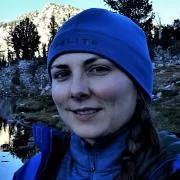
Racquel Rancier earned her master’s degree in water policy and management; and the certificate in water conflict management, in 2012. For her certificate internship, she worked with the Oregon State Legislature. Today, Ms. Rancier is a senior policy coordinator with the Oregon Water Resources Department. Visit here, to learn about her career path.
Response provided: August 2019
Bota Sharipova
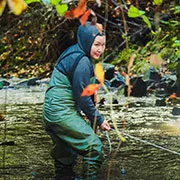
Degree/Certificate:
In 2020, I earned a Master's in Water Cooperation and Diplomacy; and the Certificate in Water Conflcit Managment and Transformation.
Your area of water-related interest/research (and MS/PhD focus and title, if you are pursuing one; or your internship details, if you did one):
I have an interest in social aspects of managing transboundary water resources. In my Master thesis I derived the definition of what is trust in international relations and transboundary water management. Also I examined the ways of how epistemic communities can contribute to better trust, as well as what are the obstacles for these communities to build trust, on the example of the newly-independent Central Asian countries. Besides, I am currently working on the research about climate knowledge and science for adaptive water governance in the Aral Sea Basin.
If you are working in a natural resources-related field (locally or internationally), tell us about it:
I have been involved in a wide range of water-related transboundary projects in the Aral Sea Basin since 2011. During 2011-2017, I worked for the International Fund for Saving the Aral Sea (IFAS), and from 2017-2018 was with the Natural Resources Institute at the German-Kazakh University. I currently work as a Consultant for youth mobilization projects in Central Asia of the International Secretariat for Water (ISW), and as a Consultant on water education in Central Asia for the Swiss Agency for Development and Cooperation (SDC).
Let us know if acquiring the certificate will help you in some unique way:
The Water Conflict Management and Transformation Course helped me to broaden my understanding of complicated relationships existing among the water users and learn about different techniques and tools utilized in water-related issues. I use this knowledge even in my relations with colleagues and friends – this course was deeply transformative for me.
If interested, you can share your e-mail address/Tweeter account/blog url:
E-mail: [email protected]
Facebook: https://www.facebook.com/bota.dussembinova/
Response Provided: September 2020
Eric Sporles
Eric is a Ph.D. student focused on “Watershed-Scale Modeling of Present-Day and Future Snow Water Equivalent: McKenzie River Basin, Oregon.” Watch Eric’s video where he discusses water resource issues in relation to climate change.
Andrew Stone
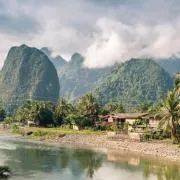
Andrew Stone is pursuing OSU's Certificate in Water Conflict Management and Transformation. Through his online class, BEE 511 - Global Environmental Change: Using Data to Inform Decisions, he developed a story map that was presented to colleagues and university students, by the featured lower Mekong basin Community-Based Organizations (CBO), at the University of Surabaya Indonesia for the international Waterkeeper Alliance East Asia Summit. Watch this video to learn more about Andrew's work on the Mekong River.
Andrew can be reached by e-mail at [email protected].
Response provided: December 2019
Michelle Tracchia
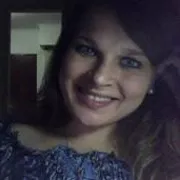
My name is Michelle Tracchia and I am a 25 year old (b. 1986) native of Northeastern Massachusetts, USA. I completed Oregon State University’s (OSU) online Graduate Certificate in Water Conflict Management and Transformation (WCMT) in June 2010. I am grateful for this online program because it allowed me to pursue my higher education while witnessing the international community and sharing my acquired knowledge from the virtual classroom.

My interest in conflict transformation largely started in February 2008 when I was introduced to the idea that globalization may have negative social side effects. After meeting an Indonesian diplomatic guest at the University of Massachusetts Boston (UMB) where I had been studying Sociology, I traveled to Jakarta, in June 2008. I stayed for the summer at an Islamic Special Orphanage and Boarding School owned by the female politician amongst child victims of the Indian Ocean 2007 tsunami; this granted me my first taste of global inequality.

While in Indonesia, I befriended two Senegalese female students who were studying at a university affiliated with the orphanage. I returned to the USA to complete my final undergrad year but traveled to Senegal for the January 2009 intersession. In West Africa, I resided with my African friends who had also returned to their home country. During my one month visit there, I also participated in an online undergrad course from UMB course titled, “Global Water and Climate Change.” To support my studies, I casually surveyed the native Senegalese citizens regarding the national water system. Additionally, I visited the now privately operated Senegalese water company learning via translator that despite the World Bank and International Monetary Fund’s influenced decision to privatize, the company remained grossly inefficient. My experience provided me a great paradigm shift; I became aware of the global water accessibility gap and I also learned I could research abroad while participating in online classes.
Returning to the USA, I searched for an online graduate program associated with Water Conflict and with great fortune found the wonderful match that was Oregon State University’s WCMT program! I applied and was thankfully accepted allowing me in June 2009, to return permanently to Jakarta, Indonesia where I could still actively be educated and contribute to an American online program.

Since then, my life has improved dramatically due to the WCMT Graduate Certificate; its facilitated courses have prompted me to consider beyond my independent experiences. Prior to this program, I was unaware of the effort necessary to transform crises. It was easy for me to see a problem, give my opinion, and largely criticize others for “not getting the job done fast enough,” however now, I have a more realistic understanding of skills, strategies, and examinations needed to move towards a sustainable resolution. Thanks to the WCMT program I believe I am less talk/critical and more action or at least more understanding.

The WCMT program groomed me and assisted me in channeling all of my former experiences into brave new ones! Through the help of my WCMT internship with a local Indonesian NGO, I networked into the Republic of Indonesia’s Ministry of Environment. Utilizing information acquired from my program courses, for almost two years, I have operated as their freelance Native English speaking negotiation consultant. I have had the privilege of learning and sharing with stakeholders of all levels including those in the office, field, and media. None may have been possible without WCMT’s understanding professors, and most especially WCMT’s director, Ms. Lynette de Silva. From my initial application process until my completion of the program, Ms. de Silva timely and sincerely responded to any questions I had.

I am grateful to be more aware of my direct/indirect actions and how I may sustainably improve not only for myself but for the benefit of others. The WCMT program presented me with countless people already striving to narrow conflict and how resolution may begin. I pray I may continue to act personally and professionally towards increased conflict transformation studies, not only associated with water. Presently, I am enrolled in the University of North Carolina’s Liberal Studies online Master’s program while previously I participated in two courses from California State University Dominguez Hill’s online Negotiation, Conflict Resolution, and Peacebuilding Master’s program. It is my hope to learn more about the social environment and how that may relate to environmental apathy. Thank you, WCMT for serving me as a great influence.
On a more personal note, because WCTM allowed me the flexibility to live and learn abroad, I had the opportunity to meet an Indonesian man who is now my husband! So, join the program and just maybe you will fall in love!
Jennifer Veilleux

Your area of water-related interest/research: MS in Environmental Science focusing on hydrogeology and specifically groundwater in karstic systems in the Lake Ohrid Watershed. And, a Ph.D. in Geography focusing on transboundary river water resources development and related human security issues specifically on the construction of the Grand Ethiopian Renaissance Dam on the Blue Nile River and the Xayaburi Dam Project in Laos on the Mekong River.
If you are working in a natural resources-related field (locally or internationally), tell us about it: Postdoctoral Associate for the Southeastern Environmental Research Center under the School of Environment, Arts, & Society at Florida International University and Project Manager of the Serengeti-Lake Victoria Sustainable Water Initiative in the Mara River Basin in Tanzania.
Let us know if acquiring the certificate has/will help you in some unique way: The ability to empathize with and better understand the complex human factor of development in the form of competing or cooperative interests and the potential impacts or solutions.
If interested, you can share your e-mail address/Tweeter account/blog URL:
Email: [email protected]
LinkedIn: www.linkedin.com/in/JenniferVeilleux
Twitter: @WorldWaters
Facebook: https://www.facebook.com/TheWayofWater
Blog: The Way of Water http://jveilleux.blogspot.com/
Response Provided: September 2015
Allison Voglesong
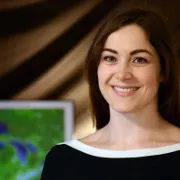
Your area of water-related interest/research: Governance of the commons, consensus, and diplomacy, (Laurentian) Great Lakes policy and law
If acquiring the certificate will help you in some unique way, tell us about it: Acquiring the WCMT certificate qualified me to apply for the Michigan Sea Grant Fellowship at the International Joint Commission at their Great Lakes Regional Office. This binational agency prevents and resolves transboundary water conflict between the Great Lakes and Canada, and every single course I took through the WCMT certificate has daily relevance in my work on public outreach regarding water quality policy and progress in the Great Lakes.
Response Provided: June 2016
Julie Elkins Watson
Julie graduated with a Water Resources Policy & Management at Oregon State University. She produced a documentary film that tells the story of the Columbia River and the diverse people and interests in the basin.
Julie says, “The Columbia River has been successfully managed by the United States and Canada for hydropower and flood control since the 1960s. The Columbia River Treaty is an inspirational example of international cooperation; however, needs and values for the basin have changed since the 1960s. Many values for the river, including salmon migration, ecosystem services, aesthetics, recreation, and cultural value were not included in the original treaty. Furthermore, the treaty was negotiated by federal entities, and important actors- from tribes to regional stakeholders - were not actively included in the process.
Today, these topics are being discussed throughout the basin. In 2024, the flood control provisions of the Columbia River Treaty will expire. This creates the perfect opportunity for all the stakeholders on both sides of the border to come together and have a conversation about the future management of the Columbia.”
Julie says, “It is my hope that this film will spark dialogue and foster a deeper understanding of the benefits that can be shared in the Columbia River Basin.”
Julie can be reached at her Twitter account.
Response Provided: October 2011